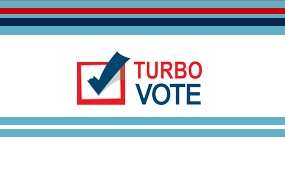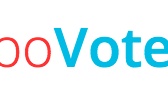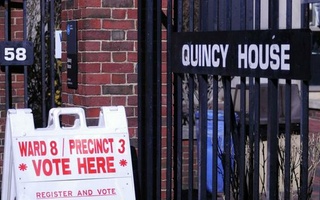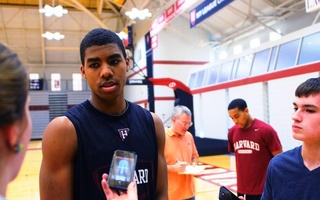“It’s really refreshing how many people here are actively involved in politics or are so interested and educated about political issues,” Reynolds says.
While Reynolds is registered to vote, she does not plan on voting until next year.
“Since I haven’t voted on anything yet, I want to wait for the presidential election,” Reynolds says.
EXERCISING YOUR RIGHT
Despite the number of active political groups at Harvard and other colleges around the country, interest in the issues does not always translate into voting in elections.
According to the Center for Information and Research on Civic Learning and Engagement, only 20.9 percent of eligible voters aged 18 to 19 voted in the 2010 midterm election.
Reed R. Snyder ’15 cited time as one reason why few students, particularly freshmen, might not register or vote.
“Harvard is a place where so much is expected of you in so many different areas, it doesn’t leave a whole lot of time to step back and think about big picture things like national politics,” Snyder says.
A varsity swimmer with 25 hours of practice a week, Snyder has not joined any political clubs this semester. However, Snyder is registered to vote and stays informed about current events and the 2012 primaries.
Alexander A. Wirth ’15, who has joined two IOP committees and participates in Harvard Model United Nations, has made youth engagement a central focus of his political activism.
Wirth blogs for the Huffington Post, is a fellow at the Forum for Youth Investment, and he chairs the Youth Working Group for the U.S. National Commission to UNESCO.
“What I advocate for is trying to get young people included in a more substantial way, so that instead of just being talked at, they are talked with,” Wirth says.
Solnet says that approximately 80 percent of Harvard undergraduates are registered to vote. According to Laura J. Simolaris, the IOP’s director of national youth engagement, 25 percent of students who registered on Study Card day this year did so in Massachusetts.
“People don’t feel like they are members of the Cambridge community,” Solnet said. “It’s the Harvard bubble effect.”
Choosing where to register to vote is a personal decision. Wirth says that choosing to register locally rather than in one’s home state depends on where students are from.
Read more in News
OCS Fair Draws Global Health OrganizationsRecommended Articles
-
 Voting Made Easy with TurboVote
Voting Made Easy with TurboVote -
 Register to Vote!
Register to Vote! -
 Voter Registration Deadline for Massachusetts on Oct. 17
Voter Registration Deadline for Massachusetts on Oct. 17 -
Voter Registration Falls Through For Some StudentsOn election day some students traveled across Cambridge—to the Friends Center on Brattle Street, Gund Hall on Broadway, Graham and Parks School, or Quincy House—only to find that they were not registered to vote.
-
 Does Harvard have a shot? New Mexico
Does Harvard have a shot? New Mexico -
 NOTEBOOK: Men's Basketball Continues Surprising Run
NOTEBOOK: Men's Basketball Continues Surprising Run













